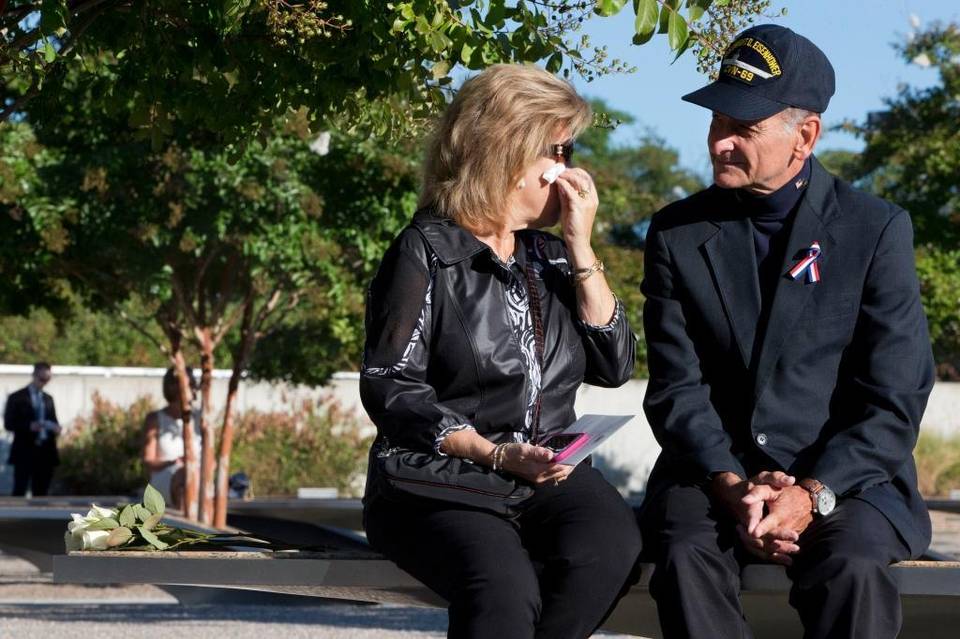James Rosen McClatchy DC
ARLINGTON, VA.– A stark reminder of the Pentagon’s most tragic day sits on the desk of Defense Secretary Ash Carter.
It’s a chunk of Indiana Limestone pulled from the rubble 14 years ago after al Qaida hijackers crashed the jet on American Airlines Flight 77 into one of the massive military headquarters’ five walls.

Betsy Wolk, with her husband, Herb Wolk, of Columbia, Md., wipes her eyes as they visit the bench dedicated to their late son-in-law, Navy Lt. Darin Pontell, on Friday, September 11, 2015, at the Pentagon Memorial on the 14th anniversary of the terrorist attacks on New York and Washington. Jacquelyn Martin AP
Carter, who was chairman of the international security department at Harvard’s Kennedy School of Government on September 11, 2001, met Friday with family members of the 184 Pentagon victims at a morning memorial service and later addressed some of the giant agency’s 23,000 military and civilian employees.
“When terrorists attacked the Pentagon, they tore a hole in this building,” Carter told the families during the private wreath-laying ceremony near the western wall that was struck. “They tore at places in your hearts that may never heal completely. But as you know better than anybody,” they did not and could not take from us what defines us.”
Carter said the piece of limestone on his desk has been passed from one defense secretary to the next – from Donald Rumsfeld, who held the post on 9/11, to Robert Gates to Leon Panetta to Chuck Hagel to Carter, who took office in February.
An inscription on the base that holds the limestone reads: “To honor the 184 people whose lives were lost, their families, and all those who sacrificed, that we may live in freedom, we will never forget.”
The 184 figure does not include five hijackers who perished along with six crew members, 48 passengers and 125 Pentagon employees after the third of four hijacked jets struck building at 9:37 a.m., 51 minutes after American Airlines Flight 11 crashed into the North Tower of the World Trade Center in New York.
“We cannot fully appreciate how much of your lives changed or how much you lost on this morning 14 years ago today,” Carter told the victims’ families. “We cannot understand how it has felt on every day since, to long for their laugh or to see their smile or to feel their embrace. We simply cannot comprehend the weight of their absence.”
A total of 2,977 [sic – 4 victims were added later who died of illnesses, 1,700 who died later of linked illnesses are not on the official list] people died in the 9/11 attacks, including 2,753 at the World Trade Center, 184 at the Pentagon and 40 passengers and crew members on United Airlines Flight 93 in a field near Shanksville, Penn.
In an afternoon ceremony with service members, veterans and civilian employees at Fort Meade, Md., President Barack Obama noted the emergence of Islamic State fighters in Iraq and Syria.
Saying “we are pounding them every day,” Obama praised the airmen who have carried out more than 6,700 airstrikes against the Islamic State in the two neighboring countries since August 2014.
At the Pentagon, several hours before Carter met with the families, a large American flag was unfurled from near the top of the complex down across the now-repaired spot where American Airlines Flight 77 struck.
In the afternoon, Carter spoke to hundreds of Pentagon workers in its central courtyard.
“On few other occasions do we see more clearly that the Pentagon is more than a bureaucracy, a building, or even a proud and noble institution,” he said. “In this courtyard today, you see also that we are a community, and not just any. We are connected by a unique and solemn mission: to defend our nation, to carry forward its values, and sometimes, as we remember today, to sacrifice for them.”
Carter recalled not only the 9/11 attacks’ victims at the Pentagon, the World Trade Center and in a Pennsylvania field, but also those who served in the Afghanistan and Iraq wars those attacks spawned.
“Today and all days, we remember those who returned from those wars with scars, seen and unseen, as well as the heroes who did not return, who gave their last full measure of devotion to this nation,” he said.
Air Force Gen. Paul Selva, vice chairman of the Joint Chiefs of Staff, attended both ceremonies, while Deputy National Security Advisor Ben Rhodes joined the afternoon event.
In the courtyard ceremony, Carter cited earlier terrorist attacks against U.S. targets in Lebanon, Kenya, Tanzania, Saudi Arabia and Yemen. Then he named leaders of al Qaida, the Islamic State and other extremist groups who have been killed by American strikes.
“No matter how long it takes, terrorists will not escape the long arm and the hard fist of American justice,” Carter said. “We will find you. And whether your name is Abu Sayyaf, or Junaid Hussain, or Nasser al-Wuhayshi, or Osama bin Laden, the result will be the same.”

